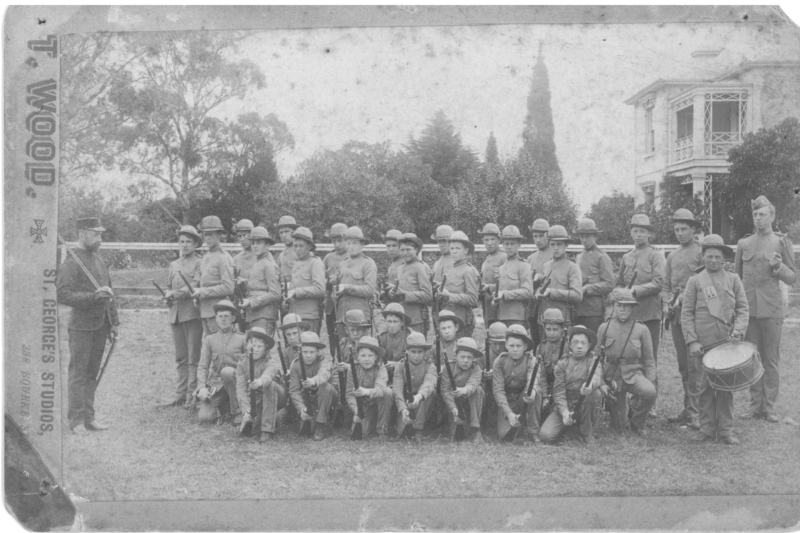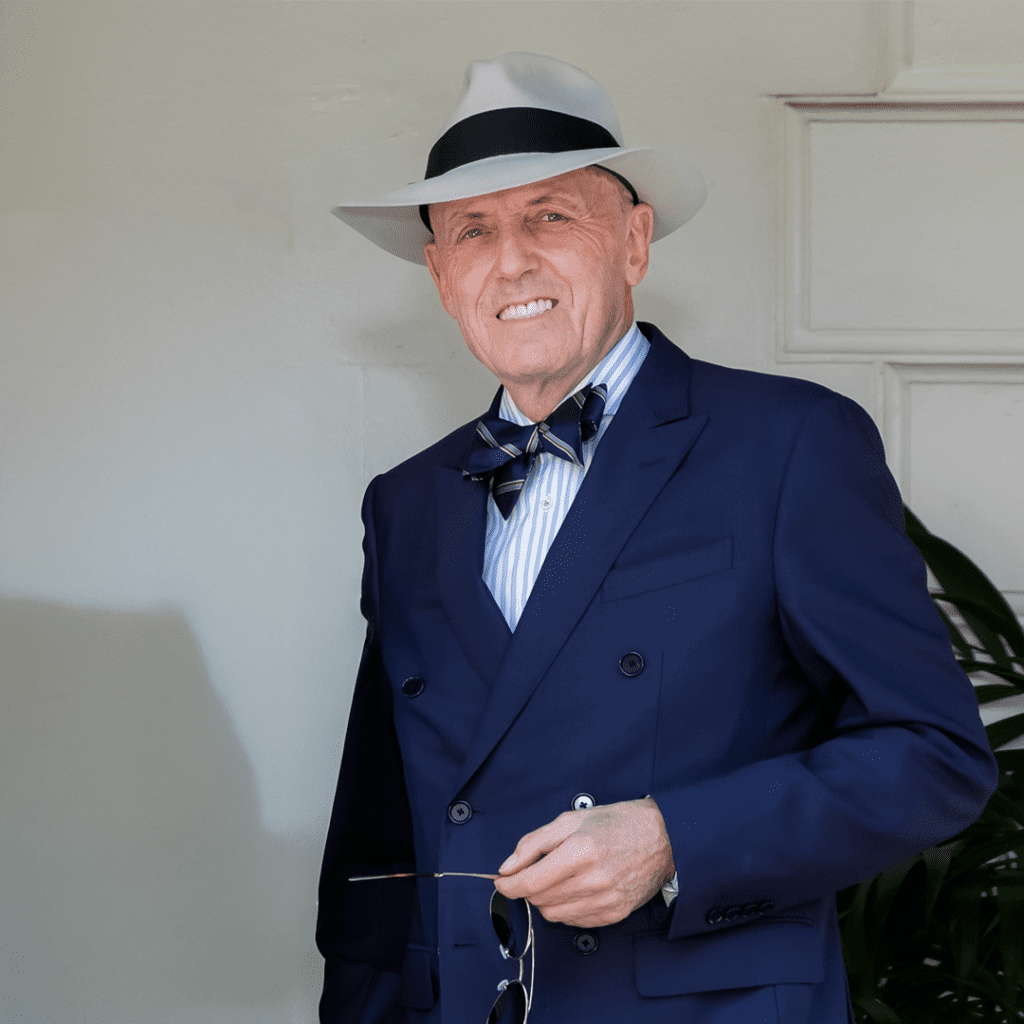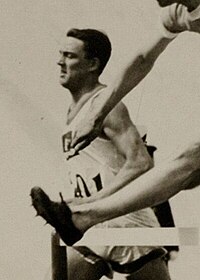Ernest Norman Coffey had a special connection with Caulfield Grammar School as he was named in the CGS Speech Night program for 1900 in an article which read in part;
OLD BOYS AT THE WAR Several members of the School Cadet Corps of past years took active part in the recent war, where they appear to have displayed the courage and gallantry of veterans. With the First Victorian Contingent there were Private Tom Stock and the School Drill Instructor, Sergeant Major Coffey.[1]
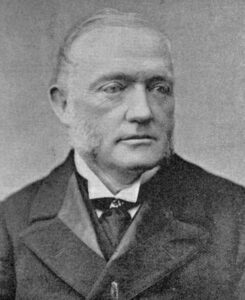
Image courtesy of the State Library of Victoria.
Caulfield Grammar School Cadet Unit
The Caulfield Grammar School Cadet Unit had been formed in 1885 and was only the fifth such unit in the state at that time. Coffey was a permanent member of the Staff of the Militia and was based at the Orderly Room in Richmond. In June 1900 another permanent member named Downey was seconded from the now Royal Australian Artillery (RAA) and temporarily appointed as a Permanent Staff of the Militia Infantry (Victorian Rangers): ‘to perform the duties of Coy. Sergt-Major during the absence from the colony, on duty, of CSM E.N. Coffey.’ Norman Coffey enlisted with the Regimental Number 1 as a Company Sergeant Major in the 1st Victorian Mounted Infantry, the same unit as Caulfield Grammarian Tom Stock and sailed for South Africa on the ‘Medic’ on 28th October 1899.
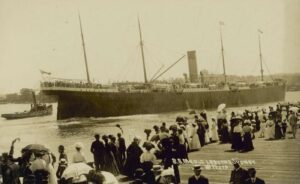
Image courtesy of the State Library of New South Wales on Wikimedia Commons.
Coffey was named in a Melbourne newspaper in March 1900, when it was noted that the Rev. Herbert Taylor of Hawthorn received a box of the Queen’s chocolate which was a gift of Sergeant H.N. Coffey (a former member of the Christ Church choir), who is with the First Victorian contingent. The newspaper wryly reported that the contents of the box when received were still intact.[2]
Return home
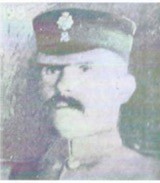
Ill health however, saw Coffey invalided to Australia in May 1900, arriving in Melbourne in early September 1900 and being awarded a pension of 3/6 per day. He was awarded the QSA and was entitled to wear four clasps for the Unit’s service in the Cape Colony, Orange Free State, Johannesburg, and Diamond Hill.
As a returned soldier from Richmond he was amongst a small group who were given a hearty welcome by local dignitaries and a Melbourne newspaper reported it as follows;
‘When the business of the Richmond Council was concluded last night (at an early hour), the mayor introduced five members of the First Contingent who had just returned from South Africa namely, Sergeant Major Coffey, Sergeant Dowd, and Privates Wood, Somerville, and Will who are residents of Richmond. The mayor called for three cheers for them and they were given with enthusiasm. An adjournment was then made to the mayor’s room where they were suitable entertained, the mayor proposing their health in enthusiastic terms.’[3]
The Boer War was declared officially over on 31st May 1902 and unfortunately for Coffey, the good wishes extended to him at Richmond, did not prevent him from succumbing to his ill-health and he died of tuberculosis at his Wellington Street home in Box Hill on 18th September 1902.
Fight for a pension
Incredibly, upon his death, his widow who was supporting four children was denied a pension, because it was deemed that Coffey had not been killed in action or died during the duration of the war! A legal battle was waged for the next twenty years, mainly by his former commanding officer’s law firm, to try and ensure that his widow received an appropriate pension and justice.
‘CASE OF MRS. COFFEY. [LETTER] TO THE EDITOR OF THE AGE. Sir, In the report in your issue of today the State Treasurer is reported to have said, “As far as he know there was no widow of a South African soldier receiving a pension from the State.” The Treasurer is in error. Regimental-Sergeant Major COFFEY contracted tubercular disease on service, which resulted in his death. During his Lifetime a pension of 3/0 per day was paid to him, in accordance with the South Africa Contingent’s Pensions Act No. 1997 of 1905. On behalf of Mrs COFFEY we made representations to the Treasurer, and pointed out to him that by the act quoted pensions were granted to the widows and dependants of soldiers killed on service and that we thought Mrs. COFFEY should receive the same consideration as was given to the dependants of soldiers actually killed in action in the South African War. Not to have granted a pension to his widow was, it appeared to us, either an error or an outrage. As we assume it was an error on the part of the Government in 1905 in not granting a pension to Regimental-Sergeant-Major COFFEY’s widow, and we so informed the Treasurer by letter on 5th October, 1918. The Treasurer, on 17th October, 1918, replied that as Mrs. COFFEY was eligible for an old age pension, she should apply for same, and he pointed out that the cases of pensions granted to widows by that act were “quite different from the case of Mrs COFFEY, as their husbands were killed in action.” On the 21st October, 1918, we replied to the Treasurer pointing out there was no substantial difference, as Regimental-Sergeant-Major COFFEY had been through the actions in which the other soldiers had been killed; and had rendered good service before contracting on service the disease which resulted in his death, “and therefore Regimental-Sergeant-Major COFFEY gave his life in his country’s service just as did the men who were killed in the actions in which he had fought.” Our interest in the matter as not merely professional. It is personal, as our Lieutenant-Colonel MCINERNEY was the officer commanding the unit in the First Contingent for service in South Africa in which the Late Regimental-Sergeant-Major COFFEY served in the South African war, and he knows how faithfully the Late Regimental-Sergeant-Major COFFEY discharged his duties on service. Yours &c., MCINERNEY, MCINERNEY and WILLIAMS. 27 January [1920].[4]
Although various Patriotic Funds had granted Mrs Coffey some small amounts of money in the years after his death, Coffey’s case seemed to have fallen into the ‘too hard basket.’ He had been sent to war in 1899 by the Victorian Government but had returned to a Federated Australia and had then to make appeals to an Australian Government which by then was controlling military matters.
Read more of our alumni ANZAC profiles here.
Researched and written by Dr Daryl Moran (CGS 1966-70; staff 1981-93; current CGS Archives Volunteer).
[1] Caufield Grammar School Speech Night programme. 1900. P, 10
[2] This commemorative tin contained chocolate and was given to the troops serving in the Boer War as a New Year gift from Queen Victoria. The three major British chocolate manufacturers, Fry, Cadbury and Rowntree, all Quaker owned companies, produced the chocolate tins. Initially they were reluctant to support the war effort because of the Quaker pacifist ethic, but were persuaded to change their minds (Australian War Memorial – Accession Number. REL23561)
[3] Argus. 7th December 1900.
[4] Age. 23rd and 30th January 1920
Feature image courtesy of Caulfield Grammar School Archives.
